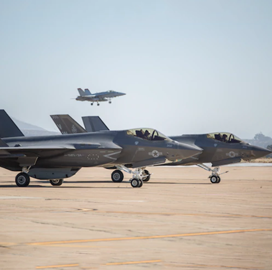The U.S. Marine Corps has declared full operational capability of F-35C aircraft operated by the service's Marine Fighter Attack Squadron 314, DVIDS Hub reported Thursday.
The milestone verifies VMFA-314's readiness for operations on U.S. Navy aircraft carriers and marks the Marine Corps' first FOC declaration for the F-35C aircraft.
Maj. Gen. Christopher Mahoney, commanding general of the 3rd Marine Aircraft Wing, said VMFA-314 will deploy with a Carrier Strike Group in 2022.
“Many hours were spent maintaining aircraft, launching and recovering aircraft in Miramar, at other military facilities, and aboard the ship to conduct the training required to meet these goals,” said Maj. Derek Heinz, operations officer at VMFA-314.
The fighter squadron received its first F-35C jet on Jan. 21st last year.





